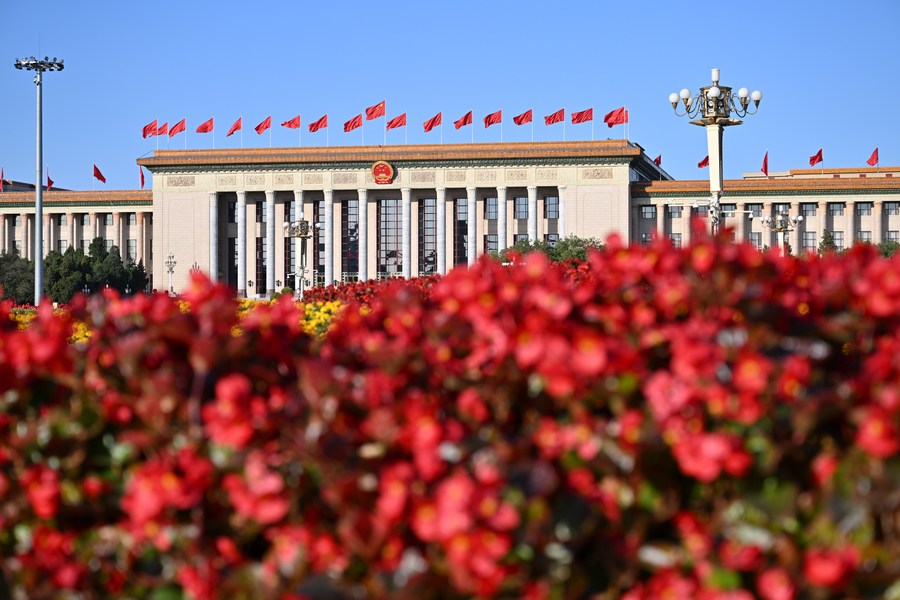Democratic system improving

The people's congress system is a crucial component of China's political structure, one of the key elements of the country's current political system, and an important institutional part of whole-process people's democracy. The people's congress system, established in 1954, is suited to China's national conditions. After decades of development, while undergoing a gradual process of refinement and adapting to changing circumstances, especially since 2012, the National People's Congress system has further matured.
For example, in March 2021, the Organization Law of the National People's Congress, which had been in use for nearly 40 years, was amended to affirm the leadership of the Party over the NPC and its Standing Committee. This crucial measure was taken to ensure the Party plays the leadership role in all national affairs, including the development of the NPC system.
Another key amendment emphasized that the NPC and its Standing Committee operate on the principle of democratic centralism, promoting democracy and collectively exercising power. The amendment reinforced the organizational and operational principles of the NPC and its Standing Committee.
Before that, in March 2018, the central leadership established the National Commission of Supervision. The 2021 amendments also introduced new provisions, such as allowing the NCS to submit proposals to the NPC and its Standing Committee, and instituting mechanisms for questioning and removing NCS members, including its head.
Alongside these changes, laws and rules such as the Legislation Law, the Rules of Procedure of the NPC Standing Committee, and the Rules of Procedure of the NPC have also been amended, ensuring that the NPC system remains relevant, improves over time, becomes more mature and assumes a more established form.
As the highest organ of State power, the NPC and its Standing Committee wield broad and diverse powers. Generally, the powers of the NPC and its Standing Committee are divided into four categories: legislative power, supervisory power, appointment and removal power, and decision-making power.
The most basic form of supervisory power is the NPC's power to deliberate on and review reports from the government, the judiciary and the prosecution services. The NPC has been exercising its powers more effectively since the 18th National Congress of the CPC in 2012. For instance, to enforce the Constitution and laws and to safeguard the unity of the national legal system, the NPC and its Standing Committee have diligently reviewed administrative regulations. Since 2017, the NPC Standing Committee has deliberated on and reviewed reports on the filing and examination of regulations on a yearly basis.
To further standardize this work, the NPC Standing Committee passed the "Decision on Improving and Strengthening the System of Recording and Review" in December 2023, which can be regarded as a system of parallel processes for resolving legislative conflicts, demonstrating a key aspect of its supervisory role. In fact, the NPC's supervision work has increasingly diversified in recent years, which has improved its mechanisms and ensured its supervision is scientific, effective, and conducted in accordance with law.
Moreover, the NPC has consolidated its social foundation. The NPC system enjoys a broad social base. One of its manifestations is that the NPC deputies today are more representative of society, with a larger percentage of them coming from the grassroots. For example, the structure of the 14th NPC (elected between December 2022 and January 2023) is highly balanced, with appropriate numbers of representatives from all regions, ethnicities and social groups. Among them, ethnic minority representatives make up 14.85 percent of the total, women 26.54 percent, grassroots workers and farmers 16.69 percent, and professionals 21.3 percent, reflecting the increasingly proportionate social foundation of the NPC system.
Relevant laws stipulate that NPC deputies must maintain close contact with their original constituencies and the public, for which they can attend local people's congress meetings and, through various channels, listen to and reflect on the views and demands of the people. To meet this need, the deputies' residents and liaison stations have been set up across the country to connect with the people.
With the progress of time, the NPC system will continue to develop in a more scientific and efficient way. But its development over the past decade, in the new era, has already become a valuable asset for the people's congress system, which will continue to play an important role in the future.
